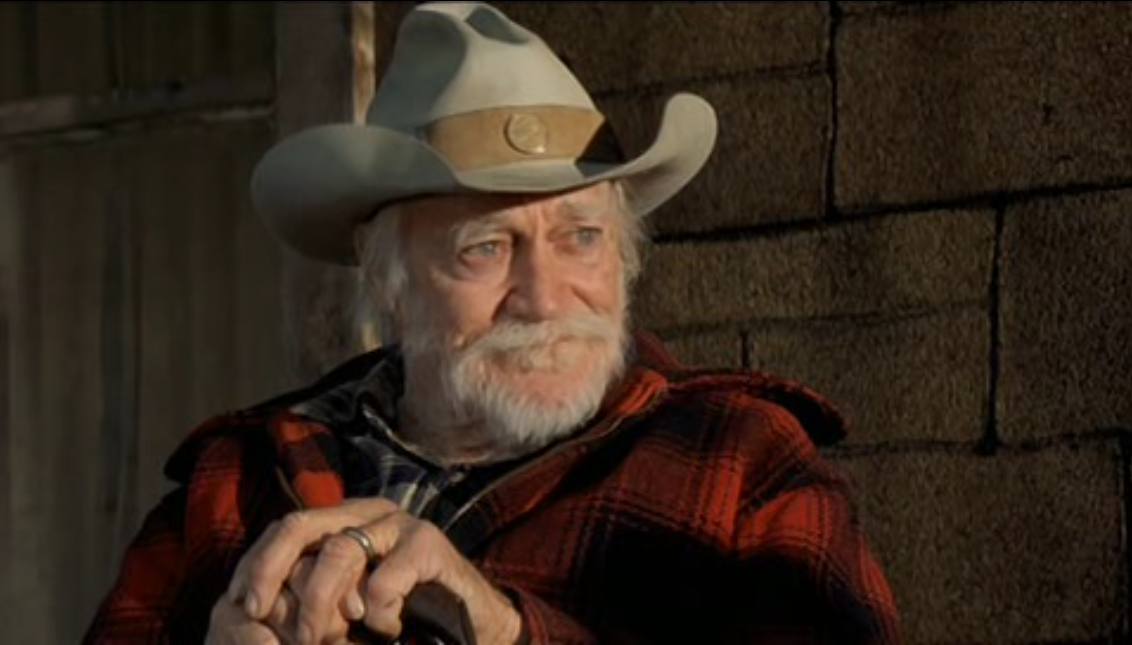The Straight Story
Written by John Roach & Mary Sweeney
Directed by David Lynch
France/UK/USA, 1999
A film entitled The Straight Story seems like a lie in the bizarre hands of a director like David Lynch, famous for injecting art house storytelling and theater styling into his more mainstream fare. An adaptation of an Iowa farmer’s journey? From Mr. Twin Peaks? Alright, what’s the catch?
The Straight Story’s title is no trick. In fact, it’s about as real as stories get, adapted from the actual 1994 journey of Iowa farmer Alvin Straight. After a less than satisfactory visit to the doctor reminds him of his mortality, Alvin (Richard Farnsworth) decides to set things right. He begins by setting off to Mt Zion, Wisconsin to make amends with his estranged brother Lyle (Harry Dean Stanton), who’s fallen deathly ill. There’s just a one problem: Alvin has no way of getting there. His vision isn’t what it used to be and he certainly can’t allow his mentally disabled daughter (Sissy Spacek) to drive the family pick-up. So despite a pair of bum legs and no apparent ability to plan ahead, Alvin does what anyone else would do and buys a John Deere tractor, hitching it up to a trailer of wieners and gasoline, and departing in the hot Iowa summer, where what might be a five-hour car drive turns into a month-long trek across swaths of farmland in small town America.

Alongside every Budweiser commercial in the past ten Super Bowls, The Straight Story definitely doubles as wheat field porn, and Lynch and cinematographer Freddie Francis showcase farm country with a sweeping economy in deep staging and arcing crane shots. There’s an undeniable whiff of antebellum romanticism here, akin to Gone With the Wind, Giant, and what Robert Elswit would more recently execute with aplomb in There Will Be Blood. Lynch coats nearly every travel scene with Angelo Badalamenti’s score, an analeptic flamenco-inspired crest of guitar pickings, and as successfully evocative as it is, Lynch has done it a disservice through his overuse. A nostalgic score and crops at dusk combine for an exquisite but shameless sentimentality, made all the more obvious by John Roach and Mary Sweeney’s scriptwork, best described as self-replicating. Alvin idles along country roads during the day. Alvin pitches a tent at night. Alvin is visited by a local friendly. Alvin reveals a snippet of his oral autobiography. Straight Story’s insular understanding of the Midwest as a country-twee fairyland nearly insults the viewer’s intelligence in its suggestion that one can drop in at a moment’s notice to any Wisconsin suburb and expect a plate of meatloaf and pipin’ hot garlic mashed. Similarly, Iowa is envisioned as a realization of Forrest Gump’s more fantastical flights of characterization, where every other personality has some endearing idiosyncrasy: a store clerk’s fondness for his “grabber”; Sissy Spacek’s spastic speech impediment; a rotund neighbor’s affinity for pink frosted donuts. The delusion even morphs into geographical uncertainty. If Alvin’s from Iowa, why does Farnsworth talk like he’s from Lexington?
Farnsworth’s presence is acceptable for a story that’s less about the man than it is about the journey, but deserving of an Oscar nomination it is not. Farnsworth speaks like an elderly John Wayne, aged to the brink of complacency. Spacek’s Rose is as entertaining as she is distracting, showing the seams in a performance that ventures little beyond a few speaking tics. Harry Dean Stanton, who occupies only a few minutes of screentime, perfectly captures the pain and regret and sorrow Farnsworth tells us he’s feeling. But then Straight Story ends, rather abruptly, too. It would be a refreshing open note to conclude with, if the ending didn’t feel so disingenuous to what’s come before it. Ironically enough, in a story about getting from point A to point B, its characters never really go anywhere. It shifts its pieces within a shallow understanding of middle Americana. In his original review, Ebert considered this simplicity “lyrical” storytelling, and certainly there’s a careful art to sparse storytelling; look to Ozu’s filmography for that. The Disney banner here is insurance enough that Lynch stays out of his own traditional bizarreness, and in the end The Straight Story succeeds at a basic level as inoffensive homey fluff. There’s no introspection, though, no meditation in what might have been a quiet, reflective picture. Reducing anything to its base parts often feels unfair, but remembering this as “That One Tractor Movie” feels mighty appropriate.
– David Klein

